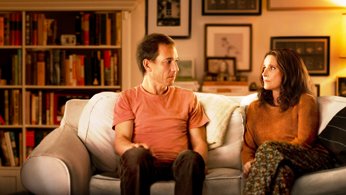
 A comedy from the inimitable Nicole Holofcener about the things we say to loved ones in order to support them that may not reflect what we really think or feel.
A comedy from the inimitable Nicole Holofcener about the things we say to loved ones in order to support them that may not reflect what we really think or feel.
You Hurt My Feelings is the satirically petulant sounding title of the latest comedy by writer-director Nicole Holofcener. Julia Louis-Dreyfus stars as a writer and teacher in New York City named Beth. She’s married to Don, a therapist played by Tobias Menzies. We get to know them as we might in life, in their work and home life, and relationships to family and friends, with the result, which Holofcener has a talent in her films for getting, that You Hurt My Feelings feels “lived in,” with dialogue that is remarkably funny without sounding too scripted.
Beth is trying to get her novel published, her second book after debuting a few years earlier with a mildly successful memoir about her abusive childhood. She’s terribly insecure about this new book, worrying and fretting about it out loud, and Don always reassures her that she’s fine and the book is good. We get to see Don interacting with patients as a therapist, and some of these are hilarious—in particular, Amber Tamblyn and David Cross as a constantly bickering couple. Don’s therapeutic approach is mild-mannered, which doesn’t always seem adequate when dealing with the eccentricities of his clients. He has self-doubts, too.
They have a 26-year-old son, Eliot, currently working at a pot store, and his mother nags him about this, saying he could do better. In the meantime, he says he’s writing a play, but won’t show it to anyone. Beth has a sister, Sarah, an interior decorator played by the excellent Michaela Watkins, married to a struggling actor, and when the sisters visit their Mom, played by the great Jeannie Berlin, the scenes really sparkle.
So, you might ask, what happens? Before I say, I need to point out that Holofcener’s writing is so natural and amusing that you’re not really thinking about what will happen while watching. She has a specific point of view, warm and insightfully comic, about life, and therein lies the simple pleasure of watching a Holofcener film.
Anyway, Beth and her sister drop in at a store they know their spouses will be in, and Beth accidentally hears her husband, Don, tell her brother-in-law that he doesn’t really think Beth’s novel is very good, and gets irritated by her constant talking and worrying about it. Beth and Sarah leave without letting their husbands know they were there, and Beth then freaks out. How could Don have lied to her all this time, telling her the book was good?
As the film goes on, it’s delightfully apparent that this is not an arbitrary plot thread like you get in situation comedies. It becomes a theme: the things we say to loved ones in order to please them, affirm and support them, that don’t always reflect what we really think or feel. Julia Louis-Dreyfus, who excelled in situation comedies on TV, has a deeper well of talent that is clearly expressed in her film work. The way she shows her character trying to deal with the warring emotions of betrayal and love of her husband is finely tuned, managing to be both funny and sympathetic. Menzies is well-matched with her—laid back where she’s intense. Holofcener is careful to show the natural wrinkles in the faces of the characters. These are middle-aged people with a lot of history, and the challenges of aging are a part of the comedy without the movie having to emphasize it very much.
Is there anyone in Hollywood, besides Nicole Holofcener, making these kind of smart, grown-up comedies of imperfection? I’m not sure. You Hurt My Feelings is another example of how to do it right.

